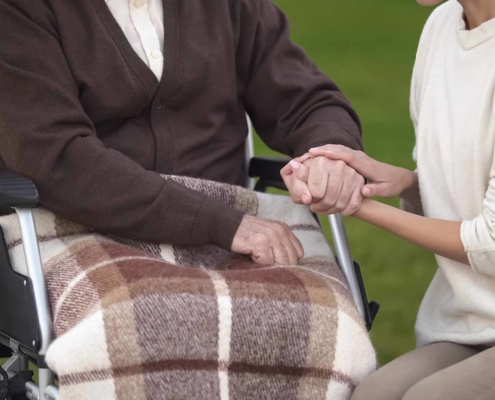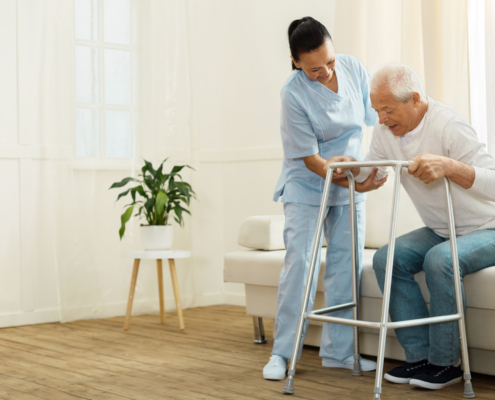
Uncovering the Importance of Senior Caregiver Support
A significant portion of older adults aged 65 and older rely on an aide or caregiver in some capacity, whether it’s a family member, a friend, a neighbor, or a home health care provider. These dedicated caregivers play a vital role in the lives of seniors, offering essential support and companionship that greatly enhances their quality of life.
Join us as we explore how these gracious heroes support seniors, from daily assistance to emotional care, and discover the profound benefits they provide to our aging loved ones.
Understanding the Importance of Senior Caregivers
A dependable caregiver attends to the daily needs of older adults, providing a supportive environment and enabling them to maintain a degree of independence. Their roles range from personal care to managing medication, reflecting the person’s requirements for assistance. Senior caregivers serve as crucial components in sustaining the comfort and health of aging individuals. They offer physical aid and emotional support, helping enrich the lives of seniors in their care.
Professional vs. Family Caregiver Support
Family caregivers often undertake this role out of necessity, duty, or affection, providing support without compensation. They may lack formal training but possess intimate knowledge of the senior’s history and preferences. Professional caregivers, on the other hand, are typically employed by a service or independently, bringing specialized training and experience to their role. This knowledge enables them to manage complex care needs effectively and navigate healthcare systems.
Exploring the Role of Caregivers
From household tasks to emotional support, senior caregivers have a wide range of responsibilities, including the following:
- Personal Care: Aides assist with bathing, dressing, grooming, and toileting. They may also help with mobility and transfers, such as getting in and out of bed or a chair.
- Healthcare Support: Care planning involves administering medications and managing medication schedules, along with monitoring health conditions and reporting any changes to healthcare professionals.
- Nutrition and Meal Preparation: Preparing nutritious meals is also part of caregiving duties. They assist with feeding if necessary, ensuring proper hydration and dietary needs are met.
- Household Tasks: Aides are absolutely required to perform light housekeeping duties, such as cleaning, laundry, and organizing. They also run errands, such as grocery shopping and picking up prescriptions.
- Companionship and Emotional Support: Kind providers can provide conversation and companionship to reduce feelings of loneliness and isolation. They also engage in activities and hobbies that the senior enjoys.
- Safety and Supervision: Ensuring the home environment is safe and free from hazards is essential. Aides supervise to prevent accidents and provide immediate assistance if needed.
- Transportation: Aides can provide transportation for medical appointments, social activities, and other outings. They also help seniors get in and out of vehicles safely.
- Coordination of Care: It is important to communicate with family members, healthcare providers, and other aides. Care providers can help communicate and keep accurate records of care provided and any changes in the senior’s condition.
These responsibilities ensure seniors receive comprehensive care, promoting their health, safety, and overall well-being.
Discover the vital role homecare providers play in enhancing the quality of life, independence, and well-being of individuals needing personalized care and support in their own homes.
Navigating the Physical and Emotional Challenges of Caregiving
The responsibilities of caregiving often extend well beyond basic needs, leading to a noticeable physical toll on caregivers. This can range from chronic fatigue to injury stemming from the physical demands of lifting or assisting the care recipient. Acknowledging these physical demands allows aides to seek appropriate strategies and supports that mitigate risks of physical strain.
Alongside the physical effects, emotional stress is integral to a caregiver’s experience. Challenges such as dealing with a loved one’s illness, feelings of isolation, and the pressure of balancing caregiving with other responsibilities can culminate in significant emotional distress.
Preventing Burnout
Without proper attention to their own well-being, aides may face burnout, characterized by exhaustion, reduced performance, and even withdrawal from caregiving duties. Preventing burnout is critical and requires early recognition of its symptoms. Aides should prioritize their health and seek help when needed to sustain their vital role without compromising their well-being.
Effective stress management practices, such as counseling, support groups, and mindfulness techniques, have been shown to provide necessary relief. Here are some additional tips primary caregivers can adopt while on the job to ensure they maintain their personal health and continue to provide adequate care:
- Exercise: Integrate activities like walking or yoga into your routine.
- Nutrition: Focus on a diet rich in vegetables, fruits, and whole grains.
- Hydration: Carry a water bottle and consume it regularly.
- Mental Health: Dedicate time for mindfulness practices.
- Boundaries: Communicate and uphold your personal limits.
- Recreation: Engage in hobbies that you enjoy to refuel your spirit.
- Social Connections: Cultivate and maintain supportive relationships.
- Sleep: Create a restful environment and adhere to a consistent sleep schedule.
- Healthcare: Schedule and attend regular medical appointments for yourself.
Ways to Support Primary Caregivers
Supporting an aide can significantly improve their well-being and ability to provide care. Here are some ways to support a caregiver:
- Assist with household chores like cooking, cleaning, and grocery shopping.
- Provide respite care to give the aide a break.
- Help with transportation for errands or appointments.
- Offer words of encouragement and appreciation.
- Contribute financially if possible, whether it’s for caregiving supplies, medical expenses, or professional caregiving services.
- Encourage them to take breaks and pursue hobbies or activities they enjoy.
- Be patient and understanding of the aide’s schedule and emotional state.
- Offer flexible support that fits into their routine and doesn’t add extra stress.
- Help arrange for professional caregiving services or home health aides when necessary.
- Organize a group of friends or family members to share caregiving responsibilities.
- Use online tools or apps to coordinate schedules and tasks among a support network.
By providing practical help, emotional support, and resources, you can help alleviate some of the burden on aides and ensure they have the support they need to continue their essential work.
How to Become a Primary Caregiver
Becoming a caregiver involves several steps, starting with understanding the responsibilities and skills required for the role. Begin by researching and completing any necessary training or certification programs, such as CPR and first aid, or specialized courses in caregiving. Gaining hands-on experience through volunteering or working in related fields can be invaluable. It’s essential to develop strong communication, empathy, and organizational skills. Depending on your location, you may need to obtain a caregiver’s license or certification.
Finally, explore job opportunities with home care agencies, healthcare facilities, or offer your services directly to families in need. Building a network of support and continually updating your skills will help you succeed in this rewarding career.
VA Benefits for Caregivers
There are many VA benefits available to aides, such as:
- Monthly Stipend: Financial compensation for primary family caregivers of eligible Veterans.
- Health Care Coverage: Access to health care through the Civilian Health and Medical Program of the Department of Veterans Affairs (CHAMPVA).
- Respite Care: Temporary relief services for aides to take breaks.
- Training and Education: Comprehensive training and resources to help caregivers develop skills.
- Travel and Lodging Reimbursement: Assistance with travel expenses for Veterans’ medical appointments.
- Mental Health Services: Counseling and support groups for caregivers to address emotional and mental well-being.
- Peer Support: Access to caregiver support coordinators and peer support networks.
These benefits aim to provide financial, emotional, and practical support to those caring for Veterans. If you’re interested in becoming a caregiver yourself, American Veterans Care Connection is here to help.
Get Dedicated Caregiver Support With AVCC
American Veterans Care Connections is dedicated to ensuring that our nation’s Veterans receive the highest quality of care in the comfort of their own homes. Our experienced and reliable senior caregivers are committed to providing personalized attention and support, enabling Veterans to maintain their independence and live comfortably.
By entrusting us with their care, Veterans and their families can have peace of mind knowing that their health and well-being are in capable and compassionate hands. Contact us today to get started.
Share This Post
Interesting links
Here are some interesting links for you! Enjoy your stay :)Pages
- About Us
- Account
- Areas We Serve
- Assisted Home Health Care
- AVCC Difference
- AVCC Provider Tools
- Bathing
- Become a Home Care Provider
- Become a Provider
- Become a Provider Now
- Blog
- Companionship
- Contact
- Contracts/Agreements
- Contracts/Agreements
- Fast Track for Providers
- Financial Assistance for Veterans
- For Providers
- Give the Gift of Home Care This Holiday Season
- Home
- Home Care Referrals
- Home Care Services
- HTML Markup
- Laundry
- Light Housekeeping
- Login
- Logout
- Meal Preparation/Feeding
- Members
- Missouri Veterans Benefits
- Password Reset
- Presentations
- Presentations
- Privacy Policy
- Private Duty Home Care
- Providers Tools and Resources
- Referral Resources
- Register
- Resources
- Start the Process
- Thank You
- Thank You – Become a Provider
- Thank You – Home Care Referral
- Thank You for Registering
- Transportation
- User
- VA Aid and Attendance
- VA Aid and Attendance Form
- VA Assisted Living
- VA Benefits for Spouses
- VA Home Health Care
- VA Nursing Home
- Veteran Emergency Assistance
- Veterans Assisted Living
- Veterans Care Coordination
- Veterans Home Care
- Veterans Home Care
- Veterans’ Assistance
- Veterans’ Pension Benefits
- Why American Veterans?










